- Home
- Frank Herbert
The Ascension Factor: Pandora Sequence Page 18
The Ascension Factor: Pandora Sequence Read online
Page 18
Just as suddenly, the visions vanished. Crista was a dreamer, but these were not dreams. She was sure the kelp had a message for her.
I’ve got to get out there.
She stared into the picture of Ben and Beatriz, stared into Ben’s eyes and concentrated on slowing her heart rate, slowing her breathing …
“I’m glad you’re here, Ben,” she said. “I’m glad it’s as it should be with Beatriz. If all is well among us we can bring Flattery down. The kelp knows this, maybe Flattery knows it, too. Inside the kelp, I can find out what all this is. The kelp is vulnerable now, as we are vulnerable. It is stunned, not dead. Help me out there, I can make the difference.”
“No,” he said. “You’re not going out there. We’ll all stay aboard the foil. Once we’re ashore we can get to an Oracle, or the beach.”
“We don’t have that much time,” she said. “I don’t know how I know it, but right now I could—become Avata, be the consciousness, the command center, the conscience of the kelp. Show me the way out.”
“You don’t know that,” he said. “Your chemistry is different, you told me so yourself. Maybe it would keep you alive out there. Maybe it would keep you dead. Just wait a few—”
“We can’t wait,” she pleaded.
She sighed, rubbed her eyes and went on. “I think he’s been using the kelp to gather data. I was blown up while they were doing it. Now he’s found out what he wanted to know and he’s heading offplanet at breakneck speed.”
When she looked up she could see that he wanted to believe her. It had been the same way last night, when she saw that he wanted to kiss her. She just knew. As she knew there was something catastrophic imminent, and Flattery knew what it was, and Flattery was fleeing as fast as he could with as much as he could.
“Stay put,” Ben said. His voice was softer, as softened as everything was now that the beating had stopped. He tousled her wet hair.
“Flattery isn’t getting away today, so let’s get out of this fix first. Give Rico and Elvira a chance to work their magic on the foil.”
She could tell that he was convincing himself. He was afraid. She knew a little something about fear. The day she had been blown free of the kelp had been a day much like this. This time, she was headed in the right direction. It was quartertide in the afternoon and they were fewer than a dozen meters from daylight.
Chapter 30
Short-term expedients always fail in the long term.
—Dwarf MacIntosh
Beatriz had taped here for the first time during the ceremonies that welcomed Current Control’s move aboard the Orbiter two years ago. She had received a tour on the arm of the mysterious Dr. MacIntosh, a dizzying tour that changed her life and included her first attempt to navigate in near-zero gravity.
Now a few of the captain’s men held her incommunicado while the rest did what soldiers throughout history had done to secure a garrison among an unarmed and isolated populace. None of them maneuvered well in low gravity. Since her only contacts were with Brood’s men, smuggling messages to Mack seemed out of the question.
What if they kill him, too?
Mack was a very compassionate man, but he immersed himself in his work and didn’t often pay attention to the ways of the world more than 150 kilometers below them. It struck her, too, that that had been her own problem. Ben had seen it and tried to help.
I know Ben’s alive, she thought, I feel it.
She hoped that Mack was alive, too, because she genuinely liked him, and because she was sure that all of their fates depended on him.
Brood needs him, too, she thought. He’ll use me as his bargaining chip.
The hatch slammed open and Yuri Brood sailed through. He rebounded into a safety webwork set up to catch rookies and keep damages minimal. Brood pointed to the bank of editing screens as he settled into the seat beside her.
“You think that because my men are warriors they can’t do your show,” he said. He was out of breath but seemed in good humor. “Well, we greenhorns have something to show you. The Director had us shoot this just before we left for the launch site. Leon turned in the rough copy on his way to the shuttle.”
She tried not to watch the screens, which displayed clips that Brood’s three techs had shot of the damage at Kalaloch. As each rolled up on a screen, a text of tentative script flashed across the console in front of her. There was a no fighting apparent in any of their tapes. It only took her glance to tell what he was up to.
“You’re trying to make this look like a hylighter disaster,” she said. “You can’t get away with it—somebody else from HoloVision must’ve been on the scene … word of mouth alone …”
She stopped when she saw his sneer, an expression that reminded her immediately of Flattery. Brood had the same narrow nose, dark, upraked brows, the same manner of tilting his head back to look down his nose at everyone.
Though he had been flushed and slightly out of breath when he came in, Brood seemed in no hurry now. He watched her eyes constantly, and this made her very nervous.
“You might have noticed how many new faces there are among the field crews these days,” he said. “Quite a few new faces around the studios, too.”
He smiled, and the smile chilled her. “Are you saying that all of the crews have been … replaced?”
“Lots of people looking for work these days,” he said, “people willing to do the necessary thing to get the job done.”
“Our job is reporting the news, telling the truth—”
His laugh cut her off.
“Your job was reporting the news, telling the truth,” he said. “Our job is keeping order, and if distorting the truth a little helps keep order, then that’s what I’ll do. People are happier this way.”
“People are dead this way, and you will have to keep killing them …”
“Watch this section,” he ordered, and snapped his fingers at Leon, “they’re sure to use it tonight. Isn’t it a lot better view of the world than what you think you saw?”
Her console read:
“Lead: Kalaloch residents flee their homes in the aftermath of a hylighter explosion that split the settlement in two.”
Scene, screen one: rescue of elderly woman from smoldering rubble of a habitat, a housing project: “OK darlin’, you hold on now, OK?”
Voiceover: “Today Vashon Security Forces rescued this elderly woman from the char that was smoldering around her cubby. Death toll has exceeded one thousand. Authorities are now estimating more than fifteen thousand people to be homeless tonight, many of them seriously injured.”
Scene, screen two: rescue crew in security uniforms alongside residents, rebuilding wall at the Preserve. Animals rounded up in background.
Voiceover: “Meanwhile thousands of animals are milling between the Preserve, where the explosion freed them, and the firestorm that laid waste to the edge of the village. Authorities here are anticipating return of most, if not all, of the Preserve’s prize livestock, which includes the only breeding pair of llamas in existence.”
Scene, screen three: heart of all the tenements, the habitats, that are still burning.
Voiceover: “In parts of Kalaloch the fires still burn, as they have for more than five hours. Much of the public market is destroyed, more than a hundred looters were reported shot in the first hours after the blast. A warehouse containing 70 percent of the sector’s rice and dry beans will burn for days, according to fire officials. Most of this year’s storage has been destroyed by flames, smoke or water. Disastrous food shortages are expected.”
“But … but that’s not even close to true!” Beatriz hissed. Her outrage broke the fear barrier. “Flattery has all that stuff buried in storage bins all over the Preserve.”
“Shh,” Brood said, still smiling. He placed a finger to his lips and nodded toward the screens.
Beatriz hated that smile, and she vowed to find a way to erase it.
Leon, the only journeyman tech of the three, frowned and cleared his
throat. Even with Brood there, he wouldn’t talk to her. He simply pointed at screen four.
Scene, screen four: the harbor, boats on fire at moorage and in the bay. Ferry terminal littered with bodies, most in bags, which the camera panned quickly, from a height.
Voiceover: “Authorities estimate that as many as five hundred commuters perished from the concussion as they changed shifts on the docks today. No ferries suffered any permanent damage and all are operating on schedule from the repair docks.”
Scene, screen five: two crying women with commuter tags, holding their ears and comforting one another. Smoke and masts in the background.
Text: “Something hit our ears, and there was that blast from those things … I don’t know what happened to us. They’re all dead …”
Voiceover: “Mrs. Gratzer and her neighbor claim that at least two class-four hylighters, attracted by fires in nearby refugee camps, exploded and destroyed several square klicks of eastern Kalaloch. Dick Leach has lost three icehouses full of seafood.”
Text: “All of our income for this year has been taken away from us, and all the bills that it took to produce that crop are still here.”
Voiceover: “They will be eligible for low-interest Merman Mercantile loans.”
Text: “If it comes to a loan we’re going to have to probably pull out. We need a miracle.”
Scene, screen six: pullaway from the body bags laid out on Kalaloch pier.
Voiceover: “The ordeal seems to be over for these commuters, but the hardship’s just beginning for tens of thousands of hungry, homeless families in the Kalaloch district.”
All screens cut to black, then her console read: “Accepted for final edit, elapsed time to follow.”
So, Brood was right all along, she thought. They’re going to run it. Beatriz didn’t feel particularly afraid anymore, just tired and incredibly sad.
“I need to see Dr. MacIntosh,” she said. “I was assigned a story on the OMC and the installation of the Bangasser drive, and I intend to do it.”
“Dr. MacIntosh has his hands full right now,” Brood said. “There’s a crisis in Current Control, a priority crisis. He knows you’re here.”
“Then let me go to Current Control.”
“No,” he laughed, “no, I don’t think so. He will come here when the time is right.” “What about the rest of them, the people here?”
“So far they suspect nothing. We have been very quiet, very selective. When shifts change, rations are left uneaten, then there will be talk. That will be hours from now, and we will be finished here.”
“Then what?”
He answered with his smile and a half-salute.
“I will check back to see how you’re doing. Go ahead with your piece on the OMC. Leon, good job. You know what to do.”
Then he was gone as quickly as he came.
“What is it you’re supposed to do, Leon?” she asked.
He didn’t answer, and he didn’t smile. He was lean and dark, like Brood, and she thought he might even be a relative.
Leon handed himself to one of the editing consoles and sat with his back to her. He was still for a moment, then he said, “We’re putting a story together on Crista Galli. And one on Ben Ozette.”
Beatriz felt herself go cold.
“And what’s the lead?”
Her voice stuck in her throat, barely a whisper.
“Crista Galli safely in the hands of Vashon Security Force.”
“And Ben … what about him?”
Leon was silent for a few more blinks. He typed something into his console and it came up on her own:
“HoloVision reporter killed in hylighter blast.”
She tried to still the trembling in her hands and her lips.
“It’s a lie,” she said. “Like the rest, it’s a lie. Isn’t it? Isn’t it?”
Without turning, without apparently moving a muscle, Leon spoke so quietly she barely heard. “I don’t know.”
Chapter 31
The gods do not limit men. Men limit men.
—T. Robbins, A Literary Encyclopedia of the Atomic Age
“Dr. Dwarf,” Spud called from behind the Gridmaster, “you were right. There’s another kelp frequency inside that sector—look here.”
Dwarf MacIntosh glanced up from underneath one of the consoles that fed the Gridmaster. Though a big man, MacIntosh had always been adept at getting at problems in small places. In fact, he preferred crawling through runnels of cables and switches to attending any of the so-called “recreational” events aboard the Orbiter.
He backed his way out of the shielding ducts and towered over Spud’s shoulder to see what he had found.
“This signal came through when we released the kelp in sector eight,” he said. “It’s taken me a while to fix and amplify.”
“I see the rest of the kelp is doing well,” MacIntosh said. He reviewed the readouts flanking the kelp display. “It released at least twenty captured cargo trains, if our data here are correct.”
Spud nodded. “They are. The kelp’s just floating free. Most of the vessels are on the surface, though, and the afternoon squall in that area’s due right about now. There are no kelpways, no way of guiding them through. Unless we get a grid in there pretty soon, they’ll just get fouled in all that slop.”
“This is a very small focus,” MacIntosh murmured.
His stare at the screen seemed intense enough to propel him right into the middle of the kelp itself. He pulled himself up to height and pressed a thin lip with his forefinger.
“Without tapping into that other signal, we won’t be able to enforce a grid. I’m sure of it. What’s the history?”
Spud spun the graphic yarn on Mack’s screen and said, “It moves.”
“Yeah.” MacIntosh nodded. “Runs the kelpways like a pro. And it’s something the kelp would gnaw a limb off for, don’t forget that.”
“So what do you think? Merman transplants being routed?”
“Signal’s too strong,” MacIntosh said. “A stand doesn’t register with us unless it’s achieved some kind of integrity, whether Flattery cuts it back or not. This is like having a whole stand of kelp in a spot no bigger than you or I …”
“And it can move.”
“And it can move.”
Mack stroked his chin in thought.
“It can persuade the kelp to resist our strongest signals, even with the threat of being pruned back to stumps. The dataflow tells us that the signal’s been getting stronger by the hour. Flattery’s been frantic about this in spite of riots at his hatchway. What does all this tell us?”
Spud frowned at the screen in imitation of Mack and tried stroking his chin, too, for answers. “There’s somebody running the kelpways, acting like a stand of kelp?”
MacIntosh whooped, grabbed Spud by the shoulders and gave him a shake. They both spun high against the upper bulkhead. The startled assistant’s eyes opened nearly as wide as his mouth.
“That’s it!” MacIntosh laughed. “What we’ve got disrupting the kelp grid in sector eight is a person pretending to be a stand of kelp!”
He dropped his grip on Spud and stuck his head back into the electronic and neuroelectronic guts of the Gridmaster.
“But who?” Spud asked.
“If you can’t guess, you’re better off not knowing right now.”
MacIntosh’s resonant voice was barely audible over the clicks and whirrs of the Gridmaster as it held the other stands of domestic kelp in functional stasis.
“More than anything right now we need a communications expert.” He backed out of the crawl space and added, with a sparkle in both eyes, “That would be Beatriz Tatoosh. Notify her that we require her services, if you would.”
Spud smiled a wide smile. “‘Services,’” he said, “that’s one way of—”
MacIntosh cut him off.
“Stow it,” Mack ordered, smiling his own wide smile. “Just get her in here, pronto.”
Chapter 32
&n
bsp; Men are moved by two principal things—by love and by fear. Consequently, they are commanded as well by someone who wins their affection as by someone who arouses their fear. Indeed, in most instances the one who arouses their fear gains more of a following and is more readily obeyed than the one who wins their affection.
—Machiavelli, The Prince
The fuel warning buzzer screeched above his console, and Spider Nevi cursed under his breath. They were very close now, very close, but he didn’t dare take chances on making contact with dry fuel tanks.
“We’re going to have to set down in that muck,” he said. “Make sure both screens and filters are intact. I don’t want kelp clogging our inlets.”
They’d seen several cargo train survivors on the surface, working to clear their intakes. They all moved in the slow-motion, dreamlike manner of those under the influence of one of the kelp’s toxins. Surface travel on Pandora’s seas was dangerous enough with the kelpways intact. Like great veins, the kelpways helped clear the waters of the storm-damaged fragments of fronds and other troublesome debris.
Zentz grunted an acknowledgment, then paled.
“But—but I’ll have to go out there after we set down,” he said. “That kelp is—it’s crazy. With only two of us …”
“With only two of us, one of us has to go out there. It’s your fault we’re out here at all, so you get the duty.”
The look on Zentz’s face was the one that Nevi wanted to see: fear. Not fear of the kelp, or fear of the sea, but fear of Spider Nevi. The expression of fear represented power to him, a raw power that even Flattery didn’t wield among the people. Flattery maintained the politician’s mask, and such a mask implied hope to anyone who witnessed it. Nevi projected no mask, no hope.
“If I go out there to clear those intakes, you will leave me.”

 Direct Descent
Direct Descent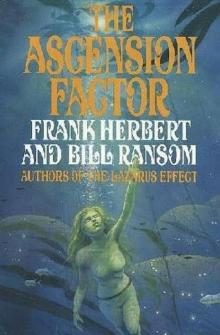 The Ascension Factor
The Ascension Factor The Heaven Makers
The Heaven Makers Children of Dune
Children of Dune Old Rambling House
Old Rambling House Dune
Dune The Worlds of Frank Herbert
The Worlds of Frank Herbert The Jesus Incident
The Jesus Incident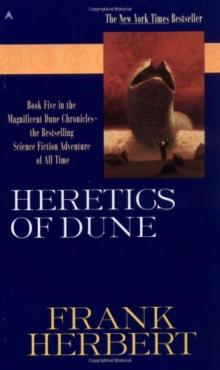 Heretics of Dune
Heretics of Dune Whipping Star
Whipping Star Dune Messiah
Dune Messiah Man of Two Worlds
Man of Two Worlds The Book of Frank Herbert
The Book of Frank Herbert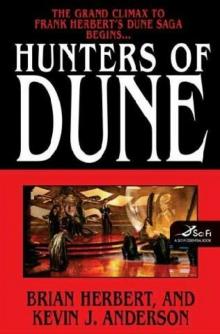 Hunters Of Dune
Hunters Of Dune The Tactful Saboteur
The Tactful Saboteur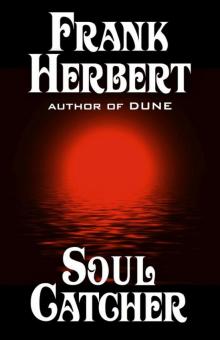 Soul Catcher
Soul Catcher God Emperor of Dune
God Emperor of Dune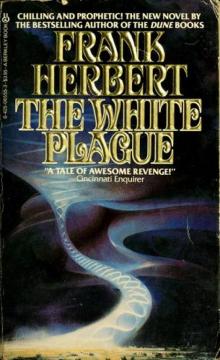 The White Plague
The White Plague The Green Brain
The Green Brain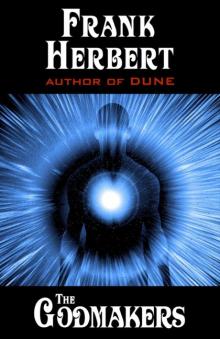 The Godmakers
The Godmakers Sandworms of Dune
Sandworms of Dune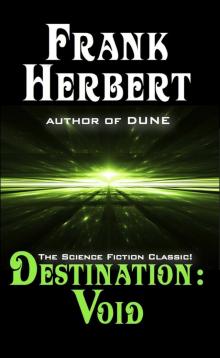 Destination Void
Destination Void The Dosadi Experiment
The Dosadi Experiment Eye
Eye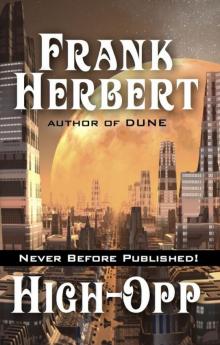 High-Opp
High-Opp The Eyes of Heisenberg
The Eyes of Heisenberg Missing Link
Missing Link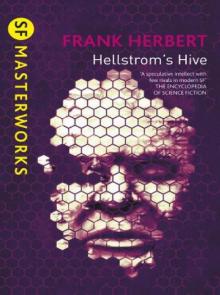 Hellstrom's Hive
Hellstrom's Hive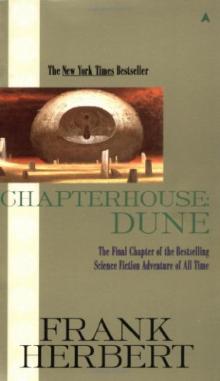 Chapterhouse: Dune
Chapterhouse: Dune The Santaroga Barrier
The Santaroga Barrier The Dragon in the Sea
The Dragon in the Sea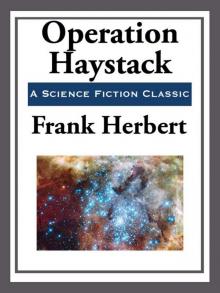 Operation Haystack
Operation Haystack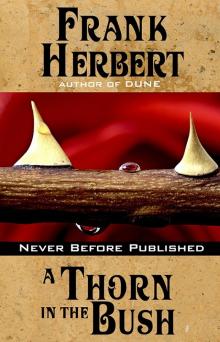 A Thorn in the Bush
A Thorn in the Bush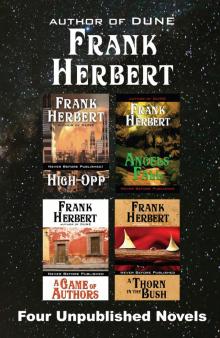 Four Unpublished Novels
Four Unpublished Novels Dune dc-1
Dune dc-1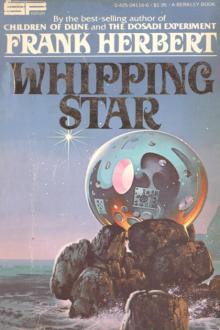 Jorj X. McKie 1 - Whipping Star
Jorj X. McKie 1 - Whipping Star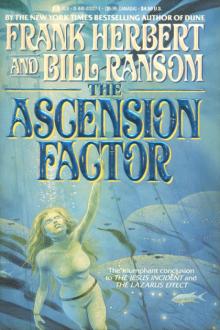 DV 4 - The Ascension Factor
DV 4 - The Ascension Factor Frank Herbert - Dune Book 4 - God Emperor Of Dune
Frank Herbert - Dune Book 4 - God Emperor Of Dune ChapterHouse: Dune dc-6
ChapterHouse: Dune dc-6 The Ascension Factor w-4
The Ascension Factor w-4 A Game of Authors
A Game of Authors Children of Dune dc-3
Children of Dune dc-3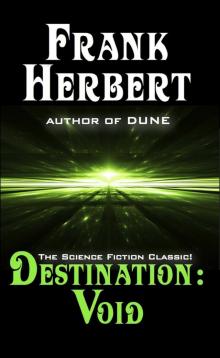 Destination: Void: Prequel to the Pandora Sequence
Destination: Void: Prequel to the Pandora Sequence The Collected Stories of Frank Herbert
The Collected Stories of Frank Herbert Dune Messiah dc-2
Dune Messiah dc-2 Frank Herbert - Dune Book 5 - Heretics of Dune
Frank Herbert - Dune Book 5 - Heretics of Dune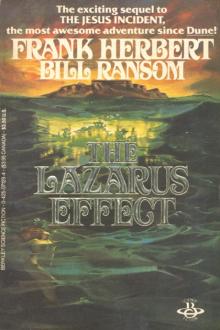 DV 3 - The Lazarus Effect
DV 3 - The Lazarus Effect The Jesus Incident w-2
The Jesus Incident w-2 The Lazarus Effect w-3
The Lazarus Effect w-3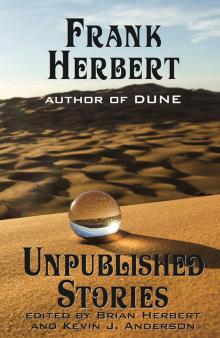 Frank Herbert
Frank Herbert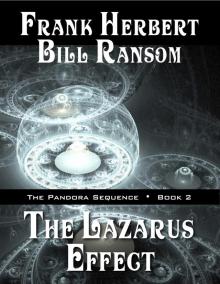 The Ascension Factor: Pandora Sequence
The Ascension Factor: Pandora Sequence Dune (40th Anniversary Edition)
Dune (40th Anniversary Edition) The Dosadi Experiment c-2
The Dosadi Experiment c-2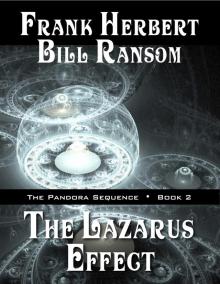 The Lazarus Effect
The Lazarus Effect God Emperor of Dune dc-4
God Emperor of Dune dc-4 The Pandora Sequence: The Jesus Incident, the Lazarus Effect, the Ascension Factor
The Pandora Sequence: The Jesus Incident, the Lazarus Effect, the Ascension Factor The Green Brain (v4.0)
The Green Brain (v4.0) The Heaven Makers (v4.0)
The Heaven Makers (v4.0) Heretics of Dune dc-5
Heretics of Dune dc-5